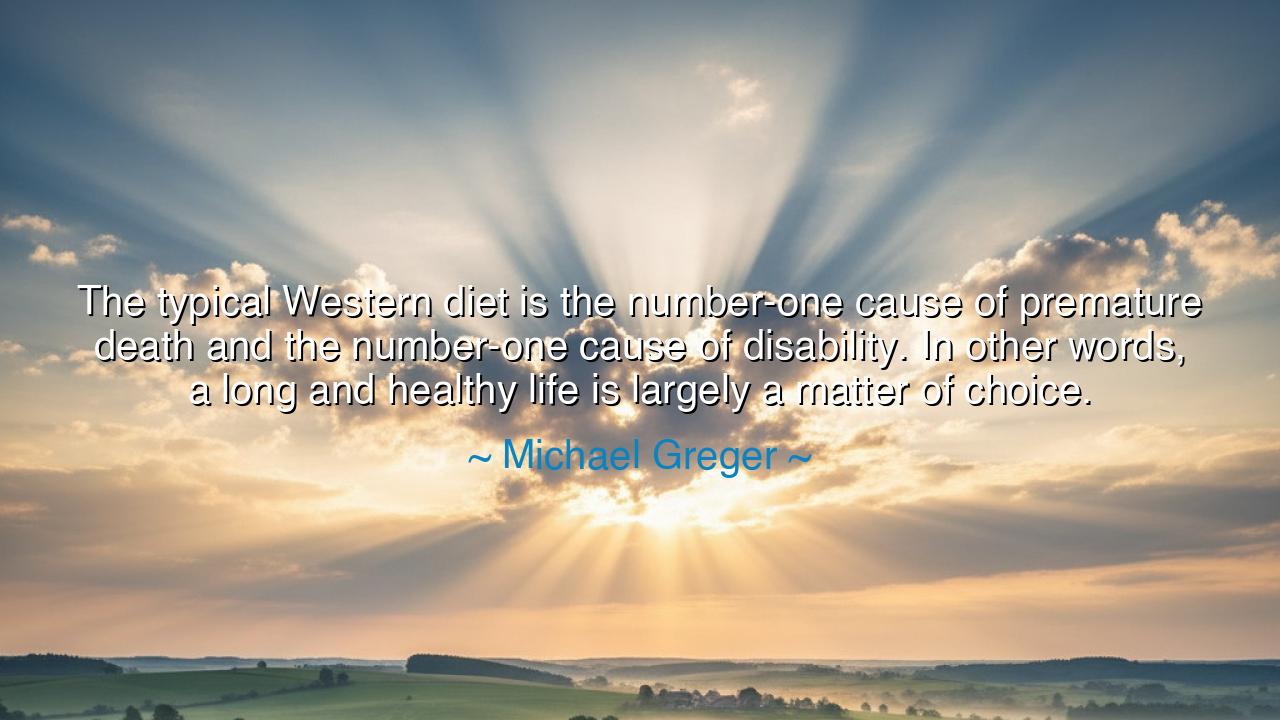
The typical Western diet is the number-one cause of premature
The typical Western diet is the number-one cause of premature death and the number-one cause of disability. In other words, a long and healthy life is largely a matter of choice.






In the solemn yet stirring words of Michael Greger, physician and teacher of modern health, there resounds an ancient truth reborn: “The typical Western diet is the number-one cause of premature death and the number-one cause of disability. In other words, a long and healthy life is largely a matter of choice.” Beneath the language of science lies a moral commandment as old as humankind itself—that life and death dwell not in fate alone, but in the daily offerings we make to our own bodies. These words are not merely a warning; they are a summons to awaken—to reclaim the sacred covenant between nourishment and vitality that our ancestors once held dear.
Long ago, in the golden ages of forgotten civilizations, food was not merely sustenance—it was sacred ritual. The ancient Greeks spoke of sophrosyne, balance and temperance, knowing that wisdom dwelt in moderation. In the East, sages taught that the body was a temple for the spirit, and that the purity of one’s food shaped the clarity of one’s soul. But in this age of abundance, where hunger has turned to excess, mankind has forgotten the wisdom of restraint. The Western diet, laden with fat, sugar, and salt, has become a silent conqueror—offering comfort yet demanding years in return. The very hand that feeds us now also robs us of our strength.
There once lived a king, renowned for his wealth and appetite. He dined each night on meats, creams, and wines, declaring that kings must live as gods. But as the years passed, his heart grew weak and his limbs heavy. One day, a humble monk came to him and said, “You have conquered lands, but not yourself.” In shame, the king turned from gluttony, and under the monk’s guidance, returned to simple food—grains, fruits, and herbs. Within a year, his vigor returned, and he ruled with newfound clarity. This tale, ancient yet timeless, mirrors the very message of Dr. Greger—that discipline in diet is not deprivation, but liberation.
To say that diet is the “number-one cause of premature death” is not an accusation, but a revelation—a mirror held to a world that has traded wisdom for indulgence. Every bite we take is a choice: between vitality and decay, between awareness and ignorance. The tragedy of modern man is not that he does not know what kills him—it is that he knows, yet chooses to ignore it. The fast-food feast is a banquet of forgetfulness; it dulls the senses and binds the will. Yet within every human heart remains the power to choose anew—to rise each day and declare, “I shall live wisely and eat with reverence.”
For health is not a gift bestowed by fortune—it is a discipline, a practice, an art. The long and healthy life of which Greger speaks is not found in miracle cures or distant secrets. It lies in the humble acts of the day: in the green of the vegetable, the simplicity of the grain, the purity of water. The ancients would call it harmony between the body and nature, between appetite and wisdom. And when that harmony is restored, life begins to bloom again—not only in years, but in spirit.
Let us not mistake Greger’s words for cold science. His message is fire. It burns through the illusion that we are victims of fate, and proclaims instead that life is a matter of choice. Every morsel we eat is an offering—to health or to decline. In our hands lies the power to lengthen our days, to strengthen our minds, to protect the sacred vessel that carries our soul. To live carelessly is to turn away from this gift; to live mindfully is to honor creation itself.
So hear this teaching, O children of the modern age: eat with awareness. Let your table be a place of gratitude, not excess. Choose foods that heal, not harm. Walk upon the earth lightly, and remember that every act of nourishment is an act of worship. When next you lift a fork, ask yourself, “Does this feed my life, or steal from it?” In that single question lies the path to both health and wisdom. For the great truth remains: to live long is not a matter of luck—it is an art, and that art begins with choice.






AAdministratorAdministrator
Welcome, honored guests. Please leave a comment, we will respond soon